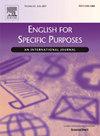A cross-disciplinary study of value arguments in doctoral theses submitted to universities in Hong Kong
IF 2.7
1区 文学
Q1 LINGUISTICS
引用次数: 0
Abstract
The doctoral thesis is a key academic genre that documents doctoral students' socialisation into their disciplinary knowledge-making practices and their contributions to disciplinary knowledge. However, little attention has been paid to how doctoral students promote the value of their research in their theses. Using Carter's value arguments (VAs) framework, this study explored how doctoral students construct VAs strategically to underscore and promote the significance of their research. Analyses of 90 doctoral theses in the disciplines of applied linguistics, psychology, and physics, submitted to UGC-funded Hong Kong universities, revealed disciplinary differences in the formal and functional classes of VAs. Formally, applied linguistics theses employed explicit VAs significantly more frequently than those of psychology and physics did. Functionally, significant disciplinary differences were found in the use of VAs to narrow the focus of a study, intensify the importance of research gaps, justify the importance of gaps in literature, demonstrate the overall value of the research, and demonstrate the value of research findings. These findings highlight disciplinary influences on VAs as a promotional strategy for doctoral students to persuade readers of their research's value and merits. Based on these findings, implications are derived for English-for-academic-purposes pedagogy, doctoral supervision, and further research on promotion.
香港大学博士论文价值论证的跨学科研究
博士论文是一种重要的学术类型,它记录了博士生在其学科知识创造实践中的社会化过程以及他们对学科知识的贡献。然而,博士生如何在论文中提升自己的研究价值却很少受到关注。本研究运用Carter的价值论点(VAs)框架,探讨博士生如何策略性地建构价值论点,以强调和促进其研究的意义。对提交给教资会资助大学的90篇应用语言学、心理学和物理学学科的博士论文进行分析后,发现VAs的正式和功能类别存在学科差异。从形式上看,应用语言学论文使用显性VAs的频率明显高于心理学和物理学论文。功能上,在使用VAs缩小研究焦点、强化研究空白的重要性、证明文献空白的重要性、展示研究的整体价值和展示研究成果的价值方面,发现了显著的学科差异。这些发现突出了学科对VAs的影响,这是博士生说服读者相信其研究价值和优点的一种推广策略。在此基础上,本文对学术英语教学法、博士指导以及进一步的晋升研究提出了建议。
本文章由计算机程序翻译,如有差异,请以英文原文为准。
求助全文
约1分钟内获得全文
求助全文
来源期刊

English for Specific Purposes
LINGUISTICS-
CiteScore
5.70
自引率
8.00%
发文量
41
审稿时长
62 days
期刊介绍:
English For Specific Purposes is an international peer-reviewed journal that welcomes submissions from across the world. Authors are encouraged to submit articles and research/discussion notes on topics relevant to the teaching and learning of discourse for specific communities: academic, occupational, or otherwise specialized. Topics such as the following may be treated from the perspective of English for specific purposes: second language acquisition in specialized contexts, needs assessment, curriculum development and evaluation, materials preparation, discourse analysis, descriptions of specialized varieties of English.
 求助内容:
求助内容: 应助结果提醒方式:
应助结果提醒方式:


